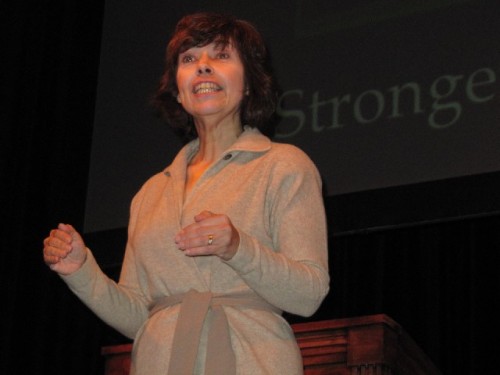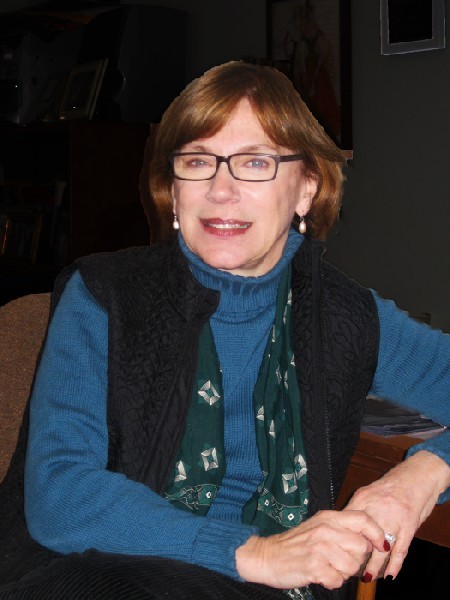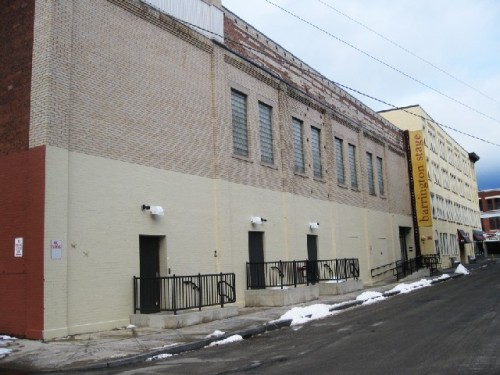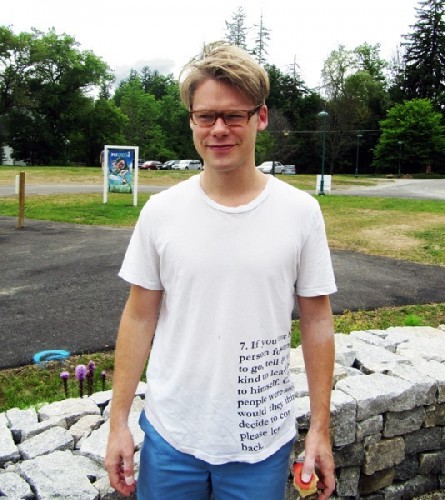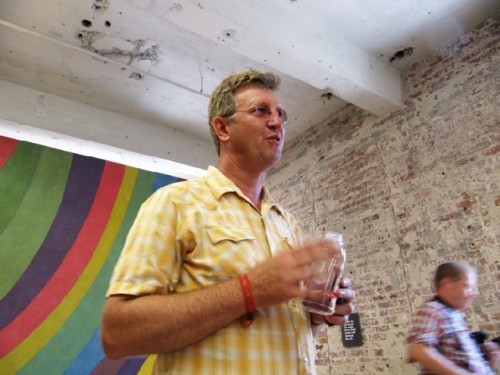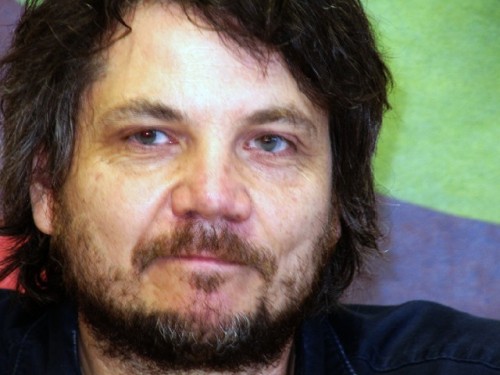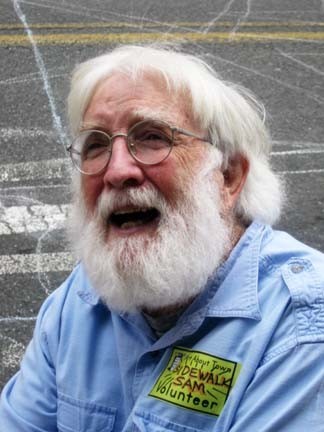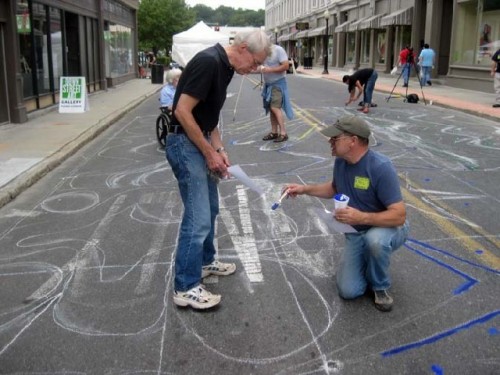Colonial/ BTF Merger: Now What
Thinking Outside Pandora’s Box
By: Charles Giuliano - Nov 22, 2010
The recent news of the pending merger of the Colonial Theatre, in Pittsfield, and Berkshire Theatre Festival, in Stockbridge, changes the playing field for the arts in the Berkshires. It is the kind of action that results in equal and opposite reaction.
The story, which broke at the end of last week, is old news by now. Or is it?
While the Berkshire Eagle provided full coverage of the merger it fell short on critical analysis. Kate Maguire, the artistic director of Berkshire Theatre Festival, and Michael MacDonald, the president of the Colonial’s board of directors, according to the paper’s Sunday editorial “BTF meets the Colonial” met with the editorial board of the Berkshire Eagle. There have been hints in the coverage as to what direction the merger may take but we are left with too many unanswered questions.
There are dots to connect. Just what is the inevitable domino effect as the merger of two major arts organizations impacts others? As Anita Walker, the director of the Massachusetts Cultural Council, indicated in remarks during the public event on Friday, this creates a new paradigm for more cooperation and mergers of arts organizations all over the Commonwealth.
In an op ed piece in the Eagle Alan Chartok wrote that “We hear that our friend Julie Boyd, the whirlwind Barrington Stage Company impresario, was also contacted about the gig and turned it down, which was probably a smart move. There's a big difference between Julie and Kate.
“Unlike Julie, a committed thespian, Kate is an administrator. Julie does an incredible job of directing as well as running her organization, while Kate concentrates on doing what she does best, recognizing and recruiting talent, running BTF, and raising money. We know that the Colonial has been in real trouble. As anyone can tell you, just having a fabulous building is not enough. The trick is the programming.”
It is not clear why it was “a smart move” for Boyd to pass on taking on the Colonial. By not doing so she opened the door for Maguire to move in, just up the street, with a larger venue and greater potential. Compare the gilded glory of the 107-year-old Colonial Theatre, restored at the cost of some $21 million, to the Spartan, but functional, Barrington Stage.
What happens next summer when Barrington launches the season, as it always does, with a crowd pleasing, popular musical? Boyd has announced that it will open with “Guys and Dolls.” Boyd loves musicals. Last summer she staged “Sweeney Todd” while Williamstown Theatre Festival simultaneously presented “A Funny Thing Happened on the Way to the Forum” another Sondheim musical. She also likes to develop new musicals and last summer most critics hated “Pool Boy” which defied reviews by selling to solid audiences on its smaller stage. Audiences loved the show that critics, for the most part, really hated. And how.
If WTF again opens with a musical, which is likely, but will take months to confirm, what happens if the Colonial also produces one to launch its combined season? Musicals are a no brainer for the Colonial but are tricky on BTF’s constricting, smaller, Main Stage.
For the past few seasons Randy Harrison has appeared in a BTF show. He has an enormous fan base and is developing as a serious and committed actor. Having Randy in a show has sold a lot of tickets for BTF.
This might be the opportunity for BTF to develop a Broadway or Off Broadway show, something it hasn’t done in recent years, built around Harrison. He has appeared in musicals and there are projects that might interest him. My colleague, Larry Murray of Berkshire on Stage, who has interviewed Randy several times, speculates that he will star as “Hamlet” for BTF. Last summer’s “Macbeth,” at BTF, was widely panned by critics. Clearly, Maguire would like to do more with the Bard.
Will potentially having three musicals in the Berkshires create synergy and a real boon for audiences, or result in tough competition to sell seats? Until now, the poorly managed and programmed Colonial has been a non factor during high season. Actually, something of a joke. But expect that to change, big time, this summer.
Seen from another vantage point does the additional programming, and competition, raise the bar which results in greater critical mass? Last season, Tanglewood pulled its weight launching the season with James Taylor and Carole King. That capacity sell out of three shows, on a Fourth of July weekend that opened with Pops, put a lot of boots on the ground in the Berkshires. You can’t be at Tanglewood every night and having all those folks and families proved to have a positive impact for the entire arts and tourism industry.
Even during a tough economy, with the exception of the Colonial, the many Berkshire arts organizations held their own last summer.
Recharging the Colonial gives more juice to Pittsfield which increasingly is the matrix and hub of the Berkshires. It is a long drive from one end of the Berkshires, Mahaiwe in Great Barrington, to the other with Mass MoCA, WTF, The Clark and Williams College Museum of Art, in the other. For Berkshire residents, particularly the ever more important year round audience, a drive to Pittsfield splits the difference.
Hopefully, the Colonial will include some of the strong programming that, until now, has been booked exclusively at the Mahaiwe. What immediately comes to mind is more dance. The Mahaiwe has had repeat bookings of Paul Taylor and the Alvin Ailey Company. Mark Morris appears annually at Tanglewood. During the summer Jacob’s Pillow runs near to capacity. They present one post season production each year with Mass MoCA. Just what prevents Pillow from working year round with the Colonial as co producer? Or any company for that matter? Including Barrington Stage.
Maguire has a full plate booking three stages and surely would welcome working with other organizations.
In 2001, when we bought a home in Adams, Pittsfield was pretty dead. The changes of the past decade have been remarkable. Maggie Mailer founded Storefront Artists Project which put new energy into abandoned commercial properties. The Berkshire Museum is completing a $9 million renovation. Barrington Stage planted roots and opened a second stage in an arrangement with the VFW. Established art dealer, Leslie Ferrin, opted out of high rent and congestion in Lenox to relocate in Pittsfield. Beacon Cinema has just celebrated its first year with a Harry Potter block party. Sidewalks are crowded during seasonal First Thursday events. There are a number of new restaurants and businesses. Pittsfield has rebranded itself as an arts mecca.
All of which underscores the disappointment that the board of the Berkshire Museum passed on the opportunity to partner with a new museum, on a downtown, abandoned church campus, to house the collection of some 10,000 tea pots and ephemera of the collectors Sonny and Gloria Kamm.
In the short run, it was too much risk and debt for the museum to assume at this time. A decade from now, it will be viewed as a missed opportunity. The museum is in the final phase of its renovation but is now locked into its footprint with no wiggle room for future expansion. It is not positioned to take full advantage of the changed and ever expanding dynamic of the city. When and if it acquires satellite property, for an expanded collection and programming, suitable real estate is likely to be less readily available and far more costly.
Some might argue that it will be a nice problem to have. Pressure to expand would be a strong signifier of progress and success.
As the new kid on the block Maguire has an incentive to be a team player with the other arts organizations in Pittsfield. In addition to its 800 seat theatre it has an enormous lobby that, until now, has done little more than sell snacks between shows. The Colonial has a liquor license. It has been suggested that the space may be used as a café and cabaret. With its spacious windows it would be so inviting to drive by on Saturday night, or after a Third Thursday event, and see something going on. There is great potential to coordinate with other organizations. When a Berkshire Museum opening ends at 8 PM, for example, guests might walk just a few steps to the cabaret.
There are far too few opportunities to hear a variety of music from jazz to rock and folk in the Berkshires. The Colonial has potential to develop the kind of smaller performances which don’t fit into its theatre. Or to program late night cabarets that start just when a main stage show breaks. One of the greatest complaints of theatre goers in the Berkshires is that there is no real night life. It’s a bummer to just head home in time to catch the news on TV. Everyone likes a snack or to linger over a beer after a show. There is also the possibility to offer dry shows for teens as a part of the mix.
All of this implies the need for development and critical thinking among arts presenters and their audiences. It is the dialogue which we hoped for in the ambitious but flawed Berkshire Forum which was held at the Colonial this fall. The arts were an underwhelming aspect of the programming. While we heard from several museum directors no theatre company, or Jacob’s Pillow, were represented. It is ironic that David Fleming, who by then had stepped down as director of the Colonial, was on a panel but Maguire, who was already negotiating with the Colonial, was not.
We still need that critical dialogue as all of the Berkshire arts organizations share common cause and mandates. There is a real need for mass marketing, pun intended, to promote the cultural attractions beyond the region. Particularly, the all important markets and audiences in New York, Boston, Connecticut and Vermont. The Commonwealth, as part of across the board budget austerity, has cut back on marketing. Given the potential return on tax revenue the reductions are not cost effective.
All of the arts organizations are striving to extend the shoulder seasons, starting earlier in May and June, and running stronger into September and October. In addition to offering more to audiences it also has a positive impact on annual revenue. There has also been some risk taking. A couple of years ago, Shakespeare & Company did well with a winter production of Elizabeth Aspenlieder in “Bad Dates.” Now, for the third year, S&Co. is planning another winter show.
In announcing a merger Maguire has discussed the potential of the Colonial as an out of town tryout venue for Broadway bound productions. It is the norm for Broadway and even Off Broadway producers to cast bankable stars. Audiences demand name recognition when shelling out big bucks for shows. Increasingly the annual Tony winners are moonlighting movie stars.
If a star studded, Broadway bound show had a run at the Colonial, it is likely that patrons would show up by dog sled in a blizzard in the dead of winter. Mark my words. Also, most of the cost and risk is assumed by the producers. The Colonial has to post a guarantee for the booking but none of the front money required to develop a project. There is more risk involved when BTF and the Colonial produce their own shows.
We continue to slog along in a challenging economy. There was a near death experience for S&Co. which they are slowly moving beyond. It has taken more than 20 years for Mass MoCA to find firm footing. Barrington Stage assumed risk and debt in securing a permanent home in Pittsfield. Everyone has had struggles and challenges, including Tangelwood. But, despite the one size fits all challenges, there are encouraging markers of progress, change, and most importantly, risk taking, adventurous programming and collaborations.
Last summer, for example, Mass MoCA established what is hoped to be an annual music festival curated by the popular rock band Wilco. There were daunting startup costs. The museum and host city had to get a feel on issues like security, crowd control, feeding and housing an influx of visitors. A major challenge was to find a way to get more of the Wilco audience into the downtown shops, bars and restaurants.
Since then, there has been a lot of thinking about how to do it better next time. Sources inform us that it is likely that the Wilco event will be shifted to June. That makes sense on a lot of levels. There is less competition and a greater chance of attracting a larger local turn out. Also, it’s when kids get out of school and are looking for something to do.
It is encouraging to note than Mass MoCA is expanding its profile in such a creative manner. The museum appears willing to be more of a player in its own community. In addition to the Wilco Festival it is currently developing projects for an annual student art event, as well as, a huge summer long, community based, project with the renowned artist, Sidewalk Sam. These are the kinds of projects that weren’t on the table even a couple of years ago.
More and more arts leaders and organizations appear willing to think outside the box. Now it is a matter of coordinating those efforts. There is a need to identify a master plan and strategy for the arts in the Berkshires.
Let’s start that process with a day long conference at the Colonial. Sooner, rather than later. Another summer season will be upon us before we know it.

